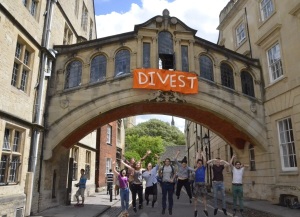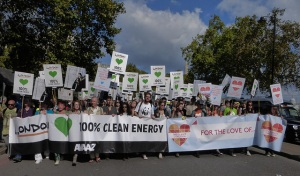 , Transition Free Press: http://transitionfreepress.org/2014/09/26/divestment-fossil-fuels/
, Transition Free Press: http://transitionfreepress.org/2014/09/26/divestment-fossil-fuels/Over the past week, hundreds of thousands of people have taken action for climate justice in 160 countries around the world, joining People’s Climate Marches ahead of the UN Climate Summit in New York on 23rd September.
Just before the Summit started, the heirs to the Rockefeller Brothers Fund, which made much of its fortune in oil and holds investments of almost £550m, announced that they were going to take their money out of fossil fuels.
The fossil fuel divestment movement has been one of the major mobilisers of climate change activists over the past year.
While for many socially-minded institutions, investing in tobacco or arms companies would be taboo, the funding of fossil fuels now looks more ethically indefensible - and less financially viable, as Amy Hall reported in this article from our Autumn issue:
When the World Council of Churches, representing over half a billion Christians, announced in July that it was removing its investments from fossil fuel companies, it sent a shockwave around the world of business as usual.
“We can’t bankrupt these companies - they’re too rich - but we can start to politically bankrupt them,” says high profile environmentalist Bill McKibben. In 2012, the campaign group he leads, 350.org, kickstarted Fossil Free, inspired by movements like the campaign against apartheid in South Africa, which also used the divestment tactic.
The anti-fossil fuels movement has become the fastest growing divestment campaign ever, according to a recent University of Oxford study, one which poses a “far-reaching threat to fossil fuel companies and the vast energy value chain”.

In its 2013 Unburnable Carbon report the Carbon Tracker Initiative calculated that between 60% and 80% of coal, oil and gas reserves of publicly listed companies are unburnable if the world is to have a chance of keeping global warming below 2°C.
This could result in ‘stranded assets’ as regulation forces companies to leave fossil fuels underground. The UK still gets 86% of its energy from fossil fuels.
Universities have seen some of the most sustained activism against fossil fuels. In May 2014, the UK’s National Union of Students passed a motion committing to divest.
Stanford University has joined 11 other US colleges and announced that its $18.7 bn endowment would no longer make investments in publicly traded companies whose primary business is coal mining.
“When I was first learning about global warming I thought that by the time I was graduating from college the problem would have been taken care of already,” says Stanford student Yari Greaney. She remains optimistic however. “This is the movement that will be remembered as the one that helped put an end to the fossil fuel industry,” she says.
The British Medical Association voted in June to end its investment in fossil fuel companies, making it the first health organisation in the world to do so. “If the health community took their money out of the fossil fuel industry it would send a really important message to both politicians and the public,” says Christopher Venables of health professionals’ organisation MedAct.
Brighthelm Church and Community Centre in Brighton was the first Church in the UK to divest, removing their investments from Shell. “We want to support and invest in a better world; that’s what we’re here for,” explains Brighthelm’s minister Alex Mabbs. “It wasn’t a difficult decision.”

Following on from the World Council of Churches’ divestment decision, a Church of England internal committee, set up to look at climate change and investment, is expected to report next year.
Local authorities are also coming under pressure. Al Chisholm of Fossil Free Oxfordshire says the county council has £42m invested directly in fossil fuel companies through its pension fund. “For many years I felt hopeless and scared about climate change,” says Chisholm, “but then I came across the idea of divestment. I think it could really be a game changer.”
From 19th until 21st September, divestment campaigners in the UK will up the pressure in a weekend of action, part of the global People’s Climate mobilisation to coincide with the New York climate summit.
Divest-Invest is a coalition of 17 philanthropic foundations who have agreed to pull out of fossil fuels, but who also work with those who are willing to move their money.
“We have this invest message which is take your money out of the old economy into the new economy - out of the dinosaurs and into the future,” explains Chuck Collins from the campaign. “We’re really promoting innovative investment in local communities. It’s about putting your money where your heart is.”

Local renewable energy projects are starting to attract significant investment sums. Bath & West Community Energy (BWCE), which was started by Transition groups from Bath and Corsham, have raised more than £2.5m from community share launches, including from people moving their self-invested pensions into the social enterprise.
Surplus funds from projects like this are often reinvested into the community, according to BWCE Chair, Pete Capener. “We are giving people an opportunity to put their money into projects that they can see, run by people they can contact,” he stresses. “That’s very different from the experience offered by traditional investments, particularly in the energy sector.”
“The choices that we make actually create the kind of economy that we want to see happening around us,” says Rob Hopkins, co-founder of Transition Network. “As communities we can divest every day.”
Amy Hall is News Editor of Transition Free Press.
Images from top to bottom: New York’s People’s Climate March by John Minchillo, under a CC License. Oxford students call for divestment by Paavan Buddhdev. Two images from the London People’s Climate March by Steve Eason, under a CC License.
No comments:
Post a Comment